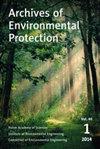波兰尼达河谷水的物理化学特性
IF 1.3
4区 环境科学与生态学
Q2 Environmental Science
引用次数: 0
摘要
对尼达河谷水的调查旨在评估其理化性质的波动。本研究采用环境监测方法评估水的理化性质变化。在 2021 年 6 月至 2023 年 5 月的 24 个月期间,共从 10 个采样点采集了 228 个水样,采样频率为每月一次。统计分析包括 Shapiro-Wilk 检验(α = 0.05)、Kruskal-Wallis 检验和 Wilcoxon(Mann-Whitney)秩和检验(α = 0.05)、Pearson 相关分析(α = 0.001)和主成分分析(PCA)。统计分析显示,全球水域样本的温度、溶解氧、pH 值、总氮、总磷、氯化物、锰和锌,以及西南部样本的 T 和溶解氧,在不同月份之间存在显著差异。Pearson 相关系数分析(α = 0.001)发现,在 SW 数据集中存在很强的正相关性。同样,在 GW 数据集之间也观察到了明显的正相关。全球大气数据集和西南大气数据集之间也发现了值得注意的正相关性。主成分分析(PCA)显示,与其他样本相比,GW2 样本之间存在很大差异,其特点是锰、铁和硫酸盐含量较高。由此产生了两个不同的组别:第一组包括 GW1、GW2、GW3、GW5 和 SW2 的样本,第二组包括所有其他样本。这项研究证明了 SW 的物理化学特性的稳定性,并强调了河岸地区 SW 和 GW 的水化学成分之间存在明显的相关性。样本水域的水化学成分具有显著特征。本文章由计算机程序翻译,如有差异,请以英文原文为准。
Physicochemical properties of water in the Nida valley, Poland
The investigation of Nida Valley water aimed to assess fluctuations in physicochemical properties. In this study, environmental monitoring method was utilized to evaluate the changes in physicochemical properties of water. Over a 24-month period, from June 2021 to May 2023, a total of 228 water samples were collected from 10 sampling sites, with a monthly sampling frequency. Statistical analyses were utilized including the Shapiro–Wilk test (α = 0.05), Kruskal–Wallis test and Wilcoxon (Mann–Whitney) rank sum test (α = 0.05), Pearson correlation analysis (α = 0.001) and principal component analysis (PCA). Statistical analyses revealed significant differences between months in GW samples for for temperature, dissolved oxygen, pH, total nitrogen, total phosphorus, chloride, manganese, and zinc in GW samples and for T and DO in SW samples. Pearson correlation coefficient analysis (α = 0.001) identified strong positive correlations within the SW dataset. Similarly, significant positive correlations were observed among the GW dataset. Noteworthy positive correlations were also detected between the GW and SW datasets. Principal component analysis (PCA) revealed a substantial dissimilarity between GW2 samples compared to others, characterized by elevated manganese, iron, and Sulfate content. Two distinct groups emerged: Group 1 included samples at GW1, GW2, GW3, GW5, and SW2, while Group 2 comprised all other samples. This study demonstrated the stability in the physicochemical properties of SW and underscore a discernible correlation between the hydrochemical compositions of both SW and GW in the riparian area. Outstanding characteristics in hydrochemical component of sample waters have been indicated.
求助全文
通过发布文献求助,成功后即可免费获取论文全文。
去求助
来源期刊

Archives of Environmental Protection
环境科学-环境科学
CiteScore
2.90
自引率
26.70%
发文量
0
审稿时长
9 months
期刊介绍:
Archives of Environmental Protection is the oldest Polish scientific journal of international scope that publishes articles on engineering and environmental protection. The quarterly has been published by the Institute of Environmental Engineering, Polish Academy of Sciences since 1975. The journal has served as a forum for the exchange of views and ideas among scientists. It has become part of scientific life in Poland and abroad. The quarterly publishes the results of research and scientific inquiries by best specialists hereby becoming an important pillar of science. The journal facilitates better understanding of environmental risks to humans and ecosystems and it also shows the methods for their analysis as well as trends in the search of effective solutions to minimize these risks.
 求助内容:
求助内容: 应助结果提醒方式:
应助结果提醒方式:


